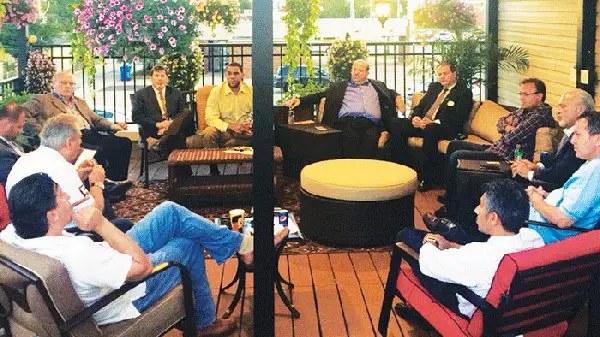
|
| Muslim and Chaldean leaders meet at The Arab American News last October. |
DEARBORN — Relations between the Chaldean and Arab communities reached a boiling point in September after Christian Iraqis vigorously protested the proposed building of a mosque in Sterling Heights, which is home to one of the largest Iraqi Christian immigrant populations in the state. City leaders rejected the mosque following a firestorm of controversy from residents who displayed xenophobia, citing zoning issues with the 20,500 square foot facility. In the wake of the incident, Chaldean and Arab leaders in metro Detroit announced that they would be forming a coalition in an attempt to defuse tensions, calling it The Arab Chaldean Friendship Forum.The group included Osama Siblani, publisher of The Arab American News; Ali Jawad, founder of the Lebanese American Heritage Club; Auday Arabo, president of the Associated Food and Petroleum Dealers and John Oram, a leader in the Chaldean community.However, the formation of the group stalled after the leaders didn’t follow up on some issues during the planning phases. Furthermore, Arabo made remarks during a speech at the Arab American and Chaldean Council (ACC) dinner in October that some Muslim leaders felt were divisive. Arabo opened an award acceptance speech reciting a Christian prayer; adding that if he were to do that in many parts of the Middle East he would be “beheaded, shot in the head or crucified.” Jawad told The Arab American News that there was a misunderstanding during the formation of the group and that communication had stalled.”Some people felt what he [Arabo] said was offensive,” Jawad said. “And since then, I think there has been a misunderstanding. I think he is a great leader. He has done a great job with the AFPD, making it the greatest it can be. We should get the group back together for the benefit of the communities.” CAIR-MI Executive Director Dawud Walid, who was also part of the coalition, said he learned there was a division in the Chaldean community over the perception of Muslims.He said a large number of Iraqi Christians who have recently settled in Sterling Heights are from the Assyrian community and have differing views than Chaldeans who have lived in the U.S. for decades.”The division has to do between religious denominations in Christianity and the length of time people lived in America,” Walid said. “The coalition had good intentions, but all the people who should have been meeting with us weren’t there. Those are newer immigrants who are Assyrian, who were behind the Islamophobia that took place in Sterling Heights.”Chaldean leader Nathan Kalasho also acknowledged troubling times between the Chaldean and Arab communities in metro Detroit. He said in order to continue co-existing together peacefully, both communities need to open an avenue of dialogue. “I’m a strong believer in communication,” Kalasho said. “I feel that communicating properly and directly could prevent 99 percent of problems. This is no different. Chaldeans and Muslims in metro Detroit are going nowhere, so it’s incumbent upon both communities to work towards strengthening ties, rather than incite fear or hate. How can we achieve lasting peace in the Middle East, when we can’t even achieve it here? It’s foolish to think the communities can be isolated or disassociated from one another. No, let’s talk.”






Leave a Reply